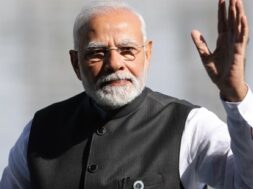
Inflation, slowdown: IMF warns of a global recession in coming months
Virendra Pandit
New Delhi: Soaring inflation and unstoppable slowdowns in the world’s three largest economies—the United States, China, and the Eurozone—have prompted the International Monetary Fund (IMF) to downgrade its assessment of the global economy this year and next, while giving an even starker assessment of what may lie ahead.
“The outlook has darkened significantly since April,” said IMF chief economist Pierre-Olivier Gourinchas. “The world may soon teeter on the edge of a global recession, only two years after the last one,” the media quoted him as saying.
“The world’s three largest economies, the United States, China, and the Euro area, are stalling with important consequences for the global outlook,” he said.
In its latest World Economic Outlook (WEO) report, the IMF cut the 2022 global GDP estimate to 3.2 percent, four-tenths of a point lower than the April forecast and about half the rate is seen last year, according to reports.
Increasingly gloomy developments have followed last year’s “tentative recovery” from the pandemic downturn in 2022 as risks materialized,” the report said.
“Several shocks have hit a world economy already weakened by the pandemic.” The IMF said that the Russian war in Ukraine has driven up global prices for food and energy, prompting central banks to raise interest rates sharply.
Ongoing Covid-19 lockdowns and a worsening real estate crisis have hindered economic activity in China, while the Federal Reserve’s aggressive interest rate hikes are slowing US growth sharply.
The IMF also warned that “risks to the outlook are overwhelmingly tilted to the downside,” and if they materialize, could push the global economy into one of the worst slumps in the past half-century.
Among the IMF’s main concerns is the fallout from the Ukraine war, including the potential for Russia to cut off natural gas supplies to Europe, a further spike in prices, and the specter of famines because of the war’s chokehold on grain supplies.
“Such shocks could, if sufficiently severe, cause a combination of recession accompanied by high and rising inflation (‘stagflation’),” the WEO said.
That would slam the brakes on growth, slowing it to 2.0 percent in 2023. It would be “getting really close to a global recession.”
The IMF said the policymakers must rein in soaring prices, even if it caused pain for their citizens since the damage caused by out-of-control inflation would be much worse.
Gourinchas noted that the “synchronized” moves by major central banks to deal with the inflation threat “is historically unprecedented, and we expect its effects to bite.”
“Tighter monetary policy will inevitably have real economic costs, but delaying it will only exacerbate the hardship,” he said.
The IMF now sees consumer prices jumping 8.3 percent this year, nearly a full point higher than previously forecast while emerging market economies face a 9.5 percent increase in consumer prices.
But, “further supply-related shocks to food and energy prices from the war in Ukraine could sharply increase headline inflation.”
That would increase the pain for poor nations least able to withstand the shock, where food makes up a larger share of family budgets.
While the global economy did a little better than expected in the first three months of 2022, it may have “shrunk in the second quarter — the first contraction since 2020,” the IMF said.
The IMF downgraded growth forecasts for most countries, including big revisions for the United States and China, cutting more than a point off the prior forecasts.
The fund now sees US growth of just 2.3 percent this year amid slowing consumer spending and rising interest rates. A recession — defined by two-quarters of negative growth–may already have begun.
Gourinchas said the US has a “very narrow path” to avoid a downturn, and even a “small shock” could tip the economy into recession.
The report said that China’s economy is expected to slow dramatically in 2022, expanding just 3.3 percent — the lowest in over four decades except for the 2020 pandemic crisis — because of continuing Covid concerns and a “worsening” property crisis.
“The slowdown in China has global consequences: lockdowns added to global supply chain disruptions and the decline in domestic spending are reducing demand for goods and services from China’s trade partners.”
The WEO report also counted some exceptions to the gloomy outlook, including upgrades for Italy, Brazil, Mexico, and Russia, which are still expected to contract but are benefiting from rising oil prices because of Western sanctions.













